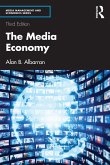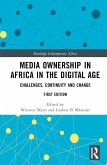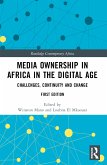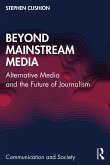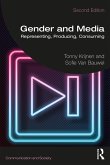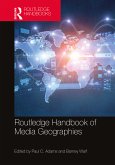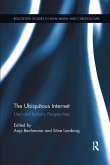Media Ownership and Agenda Control offers a detailed examination of media ownership amidst the complexities of the information age, from the resurgence of press barons to the new influence wielded by internet giants. Much of the discussion pivots around recent revelations and controversies in the media industry, such as the findings published in 2012 from the Leveson Inquiry, the US Federal Communications Commission's ruling on net neutrality in 2015, Edward Snowden's decision to leak National Security Agency (NSA) documents in 2013 and the legal battles over ancillary copyrights waged in Germany and elsewhere. Justin Schlosberg traces the obscure and often unnoticed ways in which agendas continue to be shaped by a small number of individual and institutional megaphones, despite the rise of grassroots and participatory platforms, and despite ubiquitous displays of adversarial journalism. Above all, it explores the web of connections and interdependence that binds old and new media gatekeepers, and cements them to the surveillance and warfare state. This ultimately foregrounds the book's call for a radical rethink of ownership regulation, situating the movement for progressive media reform alongside wider struggles against the iniquities and injustices of global capitalism.
This book's re-evaluation of the nature of media ownership and control in a postdigital world will prove to be an invaluable resource for students of media studies and journalism, as well as all those with an interest in the changing dynamics of media power.
Get involved: Reclaimthemedia.org
This book's re-evaluation of the nature of media ownership and control in a postdigital world will prove to be an invaluable resource for students of media studies and journalism, as well as all those with an interest in the changing dynamics of media power.
Get involved: Reclaimthemedia.org
It's a good and topical idea. Media ownership is an ongoing issue of concern relating to economics (monopoly) but also to socio-cultural ideals (pluralism, diversity, freedom of expression)... I believe that the proposal would be strengthened if the author dealt a bit more with mergers and acquisitions in the new digital era involving social media firms. This would make the work even more topical and would certainly add value. - Professor Petros Iosifidis, London City University, UK
The topics covered in this book are clearly important, timely, intriguing, challenging, complex, and fundamental... but without detailed chapter outlines, it's just hard to assess what the actual content, presentation, and level will be... If much of the principles and issues are grounded in the UK situation, then it may be of interest to individual researchers and scholars, but will not be adopted as a book in courses in other countries. - Professor Ronald E. Rice, UC Santa Barbara, USA
The proposal outlines highly appropriate areas concerning media ownership. Issues of pluralism, policy regulation and digitalisation offer a comprehensive approach to the subject. The argumentation is clear and the outline of topics is relevant...The proposal mentions empirical analyses, the use of examples and international comparisons, without specifying what these might be. The proposal seems rather UK-centric in orientation. - Helle Sjøvaag,University of Bergen, Norway
After seeing how the book was being framed, and how it is positioned relative to other available books, I became convinced that the idea of the book is indeed a good one...I would argue that the other important angle that needs to be addressed (presumably in this section, but possibly elsewhere instead/as well) is the role that these intermediaries play in the dynamics of media consumption...I was very impressed with how thorough the book's plan is, in terms of topics needing to be covered. - Professor Philip M. Napoli, Fordham University, USA
The topics covered in this book are clearly important, timely, intriguing, challenging, complex, and fundamental... but without detailed chapter outlines, it's just hard to assess what the actual content, presentation, and level will be... If much of the principles and issues are grounded in the UK situation, then it may be of interest to individual researchers and scholars, but will not be adopted as a book in courses in other countries. - Professor Ronald E. Rice, UC Santa Barbara, USA
The proposal outlines highly appropriate areas concerning media ownership. Issues of pluralism, policy regulation and digitalisation offer a comprehensive approach to the subject. The argumentation is clear and the outline of topics is relevant...The proposal mentions empirical analyses, the use of examples and international comparisons, without specifying what these might be. The proposal seems rather UK-centric in orientation. - Helle Sjøvaag,University of Bergen, Norway
After seeing how the book was being framed, and how it is positioned relative to other available books, I became convinced that the idea of the book is indeed a good one...I would argue that the other important angle that needs to be addressed (presumably in this section, but possibly elsewhere instead/as well) is the role that these intermediaries play in the dynamics of media consumption...I was very impressed with how thorough the book's plan is, in terms of topics needing to be covered. - Professor Philip M. Napoli, Fordham University, USA



